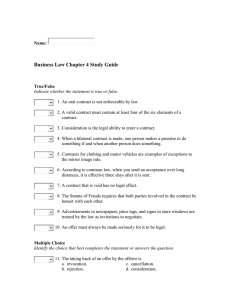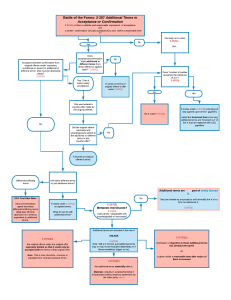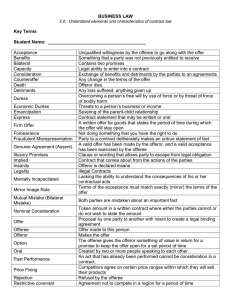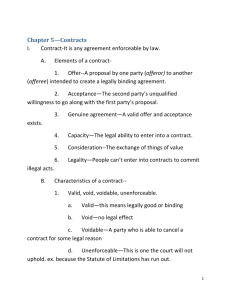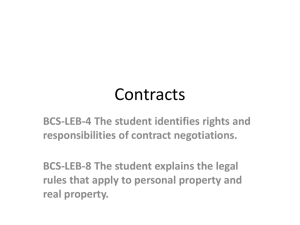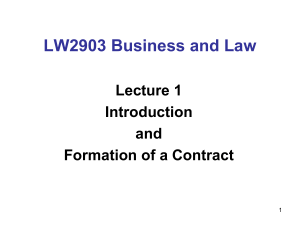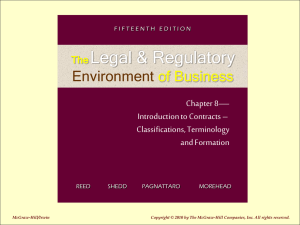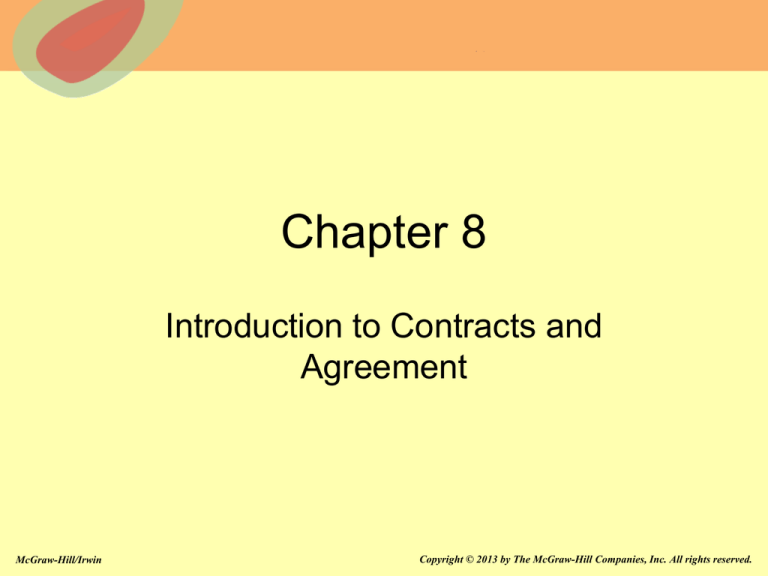
Chapter 8
Introduction to Contracts and
Agreement
McGraw-Hill/Irwin
Copyright © 2013 by The McGraw-Hill Companies, Inc. All rights reserved.
Contract
Definition: A set of legally enforceable
promises
8-2
Elements Required For Contract
Formation
• Agreement (Offer and Acceptance)
• Consideration (Bargained-For Exchange)
• Contractual Capacity (Legal Ability to Enter
Into Binding Contract)
• Legal Object
8-3
Defenses to Enforcement of Contract
• Lack of genuine assent (fraud, duress,
undue influence, misrepresentation)
• Lack of proper form requirements
(statute of frauds writing requirement)
8-4
Sources of Contract Law
• State common law
• The Uniform Commercial Code
(Article 2)
-Governs contracts for the sale of
goods
8-5
Classification of Contracts:
Bilateral or Unilateral
• “Bilateral” Contract: Exchange of
promises
• “Unilateral” Contract: Promise in
return for performance of act
8-6
Classification of Contracts:
Express or Implied
• “Express” Contract: Based on written or
spoken words
• “Implied” Contract: Based on conduct or
actions
-“Quasi-Contract” (“Implied-in-law” contract):
Imposed in certain cases to avoid unjust
enrichment, even if all elements of contract
formation not satisfied
8-7
Classification of Contracts:
Valid, Void, or Voidable
• “Valid” Contract: All elements of contract
formation satisfied
• “Void” Contract: Illegal purpose/subject
matter; unenforceable
• “Voidable” Contract: One or both parties
can withdraw from contract
8-8
Classification of Contracts:
Executed or Executory
• “Executed” Contract: All terms of contract
fully performed
• “Executory” Contract: Some duties under
contract not performed by one/both parties
8-9
Classification of Contracts:
Formal or Informal
• “Formal” Contract: Must meet special form
requirements
-Examples: Contracts under seal,
“recognizances,” letters of credit, and
negotiable instruments
• “Informal” Contract: No formalities required
in making; a “simple” contract
8-10
The Agreement: Offer and
Acceptance
8-11
Elements of a Valid Offer
• Manifestation of offeror’s intent to be bound
-Intent determined by objective, “reasonable
person” standard
-Preliminary negotiations and advertisements do
not constitute offers
• Definite and certain terms (including subject
matter, price, quantity, quality, and parties)
• Communication of offer to offeree (or
offeree’s agent)
8-12
Auctions
• Auction With Reserve
-Seller merely expresses intent to receive
offers
-Auctioneer (as representative of seller) may
withdraw item from auction at any time before
“hammer falls”
-Before hammer falls (signaling acceptance of
offer), bidder/offeror may revoke bid
• Auction Without Reserve
-Seller must accept highest bid
8-13
Termination of Offer
•
•
•
•
Revocation by Offeror
Rejection by Offeree
Death/Incapacity of Offeror
Destruction/Subsequent Illegality of Subject
Matter of Offer
• Lapse of Time/Failure of Condition(s)
Specified in Offer
8-14
Acceptance
• Represents offeree’s intent to be bound by terms of
offer and resulting contract
• Silence generally does not constitute acceptance
• Terms of acceptance must be identical to terms of
offer (“Mirror-Image” Rule)
• Effective when communicated by offeree to offeror
• If no method of communicating acceptance specified
in offer, any reasonable means of acceptance
effective (Examples: telephone, mail, fax, e-mail)
8-15
The Mailbox Rule
Acceptance by mail effective when placed
in mailbox; however, revocation of offer
effective only when received by offeree
8-16



